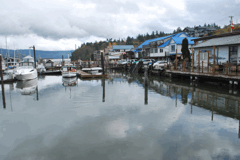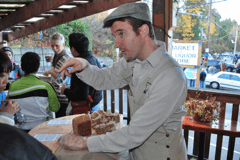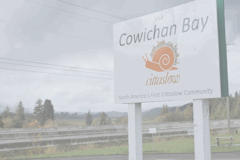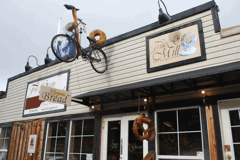Slow City
Air Date: Week of November 20, 2009

(Photo: Don Genova)
Cowichan Bay, a small Canadian town, has become the first Slow City in North America. Towns or cities have to meet certain criteria to gain slow city certification - pedestrian walkways, no big box or chain stores, a population of less than 50 thousand. Producer Don Genova visited Cowichan Bay and found a community proud of its newly gained status.
Transcript
YOUNG: A village in British Columbia has scored a North American first by becoming something called a Cittaslow, or Slow City. A Slow City is an offshoot of the Slow Food movement; it’s a sort of quiet resistance to fast lane, drive-thru homogenization. The seaside town of Cowichan Bay, north of Victoria on Vancouver Island, doesn’t have a single fast food restaurant in sight. As Don Genova reports, the villagers want to keep it that way.
[RAIN SOUNDS; SEAGULL SOUNDS]
GENOVA: It’s a grey, rainy morning in Cowichan Bay. Seagulls call, fishing boats bob gently at the pier. A hungry sailor arriving from dockside won’t find a McDonald’s or KFC in this town. Instead, eateries are called the Rock Cod Cafe and the Masthead Restaurant. Radway Fair Trade and Cow Bay’s Pirate Shack take the place of The Gap and Costco.

(Photo: Don Genova)
[SOUNDS OF BAG RUSTLING; WOMAN SAYING, “I’D LIKE A LOAF OF THE PANNED LOAF MULTIGRAIN, SLICED, PLEASE, FOR STARTERS”; SLICER MOTOR SOUNDS]
GENOVA: The True Grain Organic Bakery sits in the middle of the narrow strip of shops lining the seaside. A slicer carves through fresh loaves of bread as Bruce Stewart emerges from the milling room. He’s owned the bakery for two years now.
STEWART: Yeah, my wife Leslie and I were living in Toronto, and for a little while after that we were living in Calgary, and we decided that it was time to start a family, and we realized that we didn’t want to raise our children in a large city, having both grown up in small communities.
GENOVA: The previous owner had started a ball rolling, and Stewart quickly found himself leading the bid to designate Cowichan Bay a Cittaslow, Slow City.

Bruce Stewart owns the True Grain Organic Bakery and led the bid to make Cowichan Bay a slow city. (Photo: Don Genova)
STEWART: What Cittaslow is going to allow us to do is take all the hard work that’s been done by so many different individuals and so many different groups and put it all together and allow us to use it as a framework and move forward to do better. We can be doing a lot better in terms of recycling in the community; we could be doing a lot better in terms of environmental infrastructure.
GENOVA: Cittaslow is an international network of 120 towns in 16 countries. It was founded a decade ago by mayors of some small historic towns in Italy, looking for a way to preserve their culture. They were helped by the same man who founded the Slow Food movement, Carlo Petrini. Mara Jernigan is the president of Slow Food Canada.
[CROWD SOUNDS]

(Photo: Don Genova)
JERNIGAN: So they started to identify the characteristics that defined that kind of cultural identity for a town, so pedestrian walkways, you know, bicycle, not too much light pollution, and just decided to put together Cittaslows.
[VOICES TALKING IN CROWD]
GENOVA: It seems like the whole town of 3,000 is on the docks of the Cowichan Bay Maritime Museum, preparing for a Cittaslow celebration. Towns must have fewer than 50,000 people to qualify. They are judged on many factors: environmental policy, land use, availability of local food ingredients, encouragement of craft products and independent businesses. Marks are even given for a community’s friendliness and hospitality. Jernigan says Cowichan Bay was an ideal candidate given how it stands out from neighboring urban areas.
JERNIGAN: You know just south of here in Langford it’s full of big box stores, and we’ve got fast food restaurants all over the highway in Duncan, I think one day I counted and there’s 16, within a one-kilometer basis right in the heart of downtown Duncan and that kind of thing is really destructive to the health and the economies of small, local places, and Cowichan Bay, you know, for one reason or another, is different. It’s more about what we’re not, you know.
MAN: I’m honored to have the privilege to officially announce that Cowichan Bay is North America’s first Cittaslow community.
[APPLAUSE AND CHEERING; CROWD SOUND]

(Photo: Don Genova)
GENOVA: A crowd welcomes the announcement, the celebration made more complete with local wine, seafood and bounty from nearby farms. The Cittaslow committee is a volunteer group. But keeping the nature of Cowichan Bay intact is in the hands of politicians who pass municipal bylaws and approve changes in zoning. Cowichan Bay is an unincorporated village, administered by a much larger regional council, which has approved big box growth in other areas. Lori Iannidinardo sits on that council. She says a new Official Community Plan is in the works.
IANNIDINARDO: It’s the community’s input, it’s not my say, it’s the community making this document, it is a living document, but it’s also, if a developer comes and they have a look at our official community plan, they’ll go wow, this is the style of this community, this is the design, and we hope to work on that.
GENOVA: It’s not just developers that will get the message. Guests to Mara Jernigan’s farmhouse bed and breakfast are quick to pick up the feel of the region.
JERNIGAN: By the time they leave they say, ‘Wow, I feel like I met all these people in the community, I know where the chicken comes from, I know where the vegetables come from, where the cheese and the bread’, and that’s a very, very special thing that we have.
[SEAGULL SOUNDS; WATER SOUNDS]
GENOVA: Naramata in British Columbia will join Cowichan Bay to become Canada’s second Cittaslow, and Sonoma, in California, will become the USA’s first Cittaslow at the end of November. So, it looks like this idea of slowing down life in small towns in North America is gathering speed. For Living On Earth, I’m Don Genova in Cowichan Bay, British Columbia.
YOUNG: Well, you can see pictures of Cowichan Bay and learn more about Slow Cities at our website, LOE dot org.
Links
Cowichan News Leader article on Cowichan Bay becoming North America's first slow city
Citta Slow originated in Italy. Here's a description of some slow Italian towns.
Living on Earth wants to hear from you!
Living on Earth
62 Calef Highway, Suite 212
Lee, NH 03861
Telephone: 617-287-4121
E-mail: comments@loe.org
Newsletter [Click here]
Donate to Living on Earth!
Living on Earth is an independent media program and relies entirely on contributions from listeners and institutions supporting public service. Please donate now to preserve an independent environmental voice.
NewsletterLiving on Earth offers a weekly delivery of the show's rundown to your mailbox. Sign up for our newsletter today!
 Sailors For The Sea: Be the change you want to sea.
Sailors For The Sea: Be the change you want to sea.
 The Grantham Foundation for the Protection of the Environment: Committed to protecting and improving the health of the global environment.
The Grantham Foundation for the Protection of the Environment: Committed to protecting and improving the health of the global environment.
 Contribute to Living on Earth and receive, as our gift to you, an archival print of one of Mark Seth Lender's extraordinary wildlife photographs. Follow the link to see Mark's current collection of photographs.
Contribute to Living on Earth and receive, as our gift to you, an archival print of one of Mark Seth Lender's extraordinary wildlife photographs. Follow the link to see Mark's current collection of photographs.
 Buy a signed copy of Mark Seth Lender's book Smeagull the Seagull & support Living on Earth
Buy a signed copy of Mark Seth Lender's book Smeagull the Seagull & support Living on Earth

